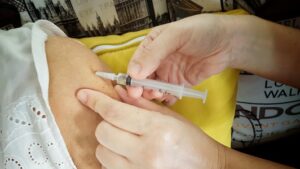Title: The Declining Trust in COVID Vaccinations: What It Means for America’s Public Health Strategy

As we navigate through the complex landscape shaped by the COVID-19 pandemic, one thing is clear: the enthusiasm for vaccinations has significantly waned across the United States. Recent polling data from the Pew Research Center reveals that a notable 60% of Americans are hesitant about receiving the updated COVID vaccine.
A Shift in Public Perception
Just a few short years ago, long lines formed as individuals eagerly awaited their chance to be vaccinated, believing it to be the ultimate solution to the pandemic. Fast forward to today, and only 24% of the population expresses confidence in getting the updated shot, while an additional 15% have already done so. This sharp decline in trust reflects broader skepticism toward health authorities, notably the Centers for Disease Control and Prevention (CDC). Once seen as the bastion of reliable health information, the CDC’s recent recommendations—advocating for universal vaccination among everyone older than six months—now find itself increasingly ignored by the public.
Political Divides and Concerns
The divide in vaccination rates reveals a stark political landscape: 81% of Republicans stand against taking the vaccine compared to just 39% of Democrats. This polarization further complicates public health messaging, as a significant portion of the population—61%—believe they don’t need the vaccine, citing studies that question its efficacy in preventing transmission or infection. Moreover, a concerning 60% express fears of potential life-altering side effects, reflecting a broader apprehension towards medical interventions that have not been transparently communicated.

Questioning Two Years of Strategy
Adding fuel to this fire is a comprehensive 520-page report released by the House Select Subcommittee on the Coronavirus Pandemic. This investigation counters the once-prominent narrative that COVID-19 originated from bat populations, concluding instead that it "most likely emerged from a laboratory in Wuhan, China." Such revelations beg the question: How did we end up in a situation where mask mandates, social distancing, and extended lockdowns were largely implemented without substantial scientific backing?
The report suggests that these harsh measures not only failed to contain the virus but also inflicted considerable harm on both the economy and public mental health. The implications of these findings are profound. How will they alter public trust in health guidelines moving forward?
CALL FOR CHANGE: Restructuring Supply Chains
In light of these findings, the need for individual states to begin stockpiling their own medical supplies becomes apparent. The report emphasizes a crucial point: a considerable proportion of medications consumed in the U.S. are manufactured overseas, predominantly in China, which places a stranglehold on America’s healthcare supply chain.
As we delve further into this narrative, we cannot ignore the vital questions that remain unanswered:
- Will pharmaceutical companies ever disclose the full contents of COVID-19 vaccines?
- Will the advocates of strict lockdowns and masking policies be held accountable for their actions?
- How will public confidence evolve as more citizens begin to question the narratives propelling the “trust the science” mantra?
A New Era of Public Health Awareness
At Extreme Investor Network, we believe this moment presents a pivotal opportunity for change. The ongoing skepticism surrounding the vaccine rollout signals a shift toward more independent thinking among the public. As we forge ahead, fostering an informed populace that demands transparency and accountability from healthcare authorities will be crucial.
We invite our readers to embrace this new paradigm—one that prioritizes critical thinking and individual empowerment over blind trust in institutions. This is an epoch where understanding the economic implications intertwines with healthcare choices, emphasizing the vital connection between personal health decisions and broader socio-economic outcomes.
In conclusion, while we confront the shadow of a pandemic that has reshaped our world, let’s not forget that change often arises from paralysis. The past two years may have erupted in chaos, but the future is ripe for informed discourse, accountability, and, ultimately, progress. Join us at Extreme Investor Network as we navigate these challenging waters together.

